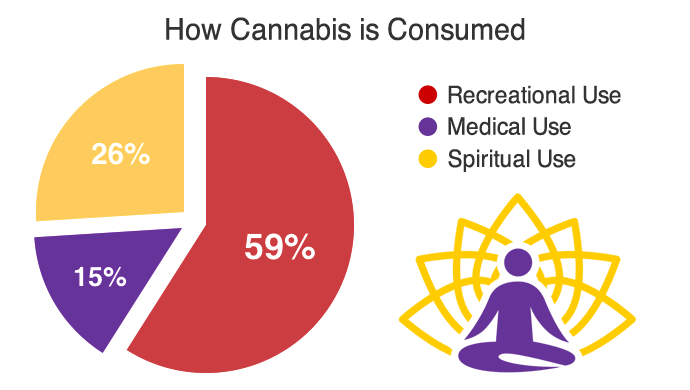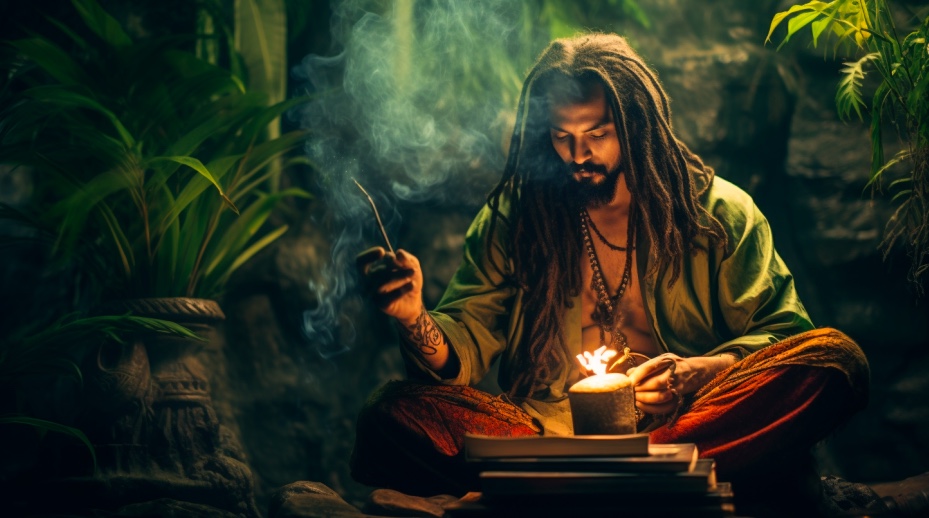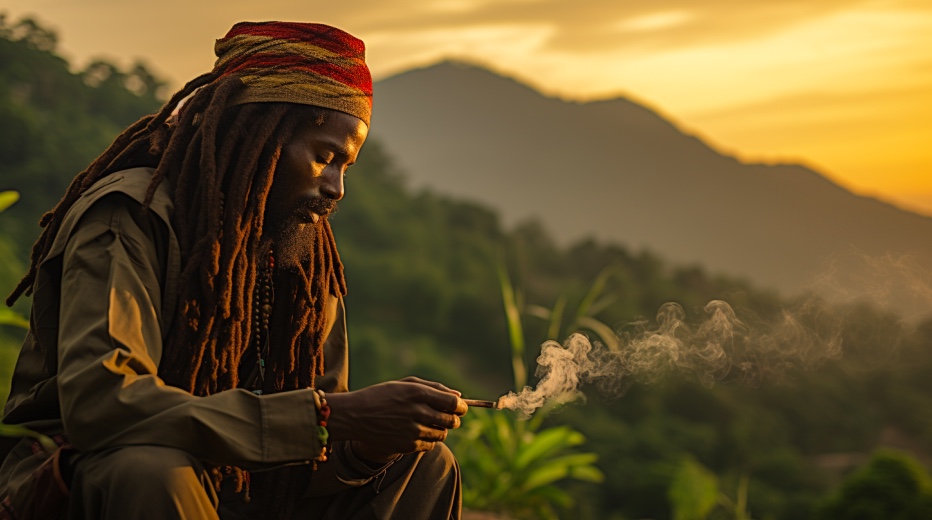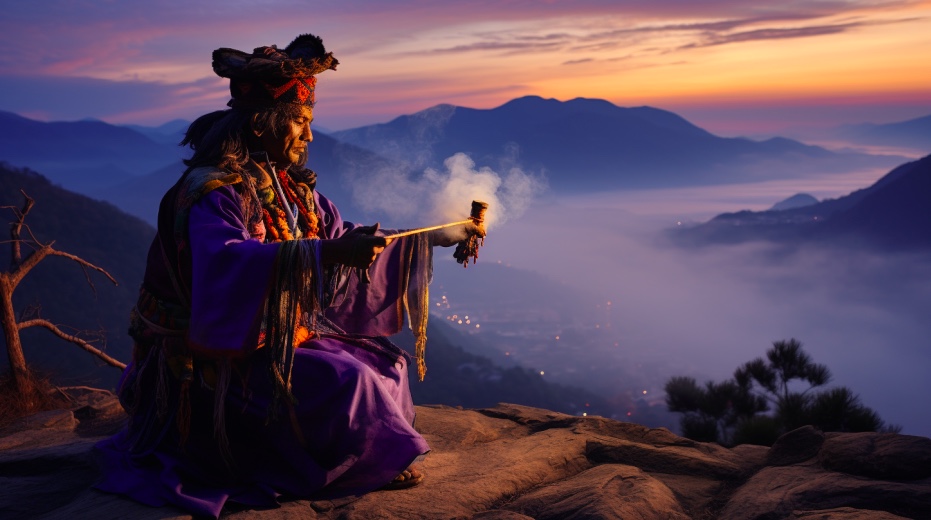Delving into the Spiritual Realm of Cannabis is no simple task. The concept of entheogens, which translates to generating the divine within, is central to understanding the spiritual relationship that many have with cannabis. Entheogens are psychoactive substances that, rather than being used for recreation or purely medicinal purposes, are utilized in a religious or spiritual context to promote personal growth and enlightenment. Cannabis, with its long history dating back over 5,000 years and intertwined with spiritual practices linked to various religious texts and rituals, undoubtedly falls under this category.
When people use the Marijuana Drug Test Calculator to determine when they’ll pass a drug test, they are given the option to choose why they use cannabis (Recreational, Medical, and Spiritual). These are the results:

- Options: Recreational, Medical, or Spiritual
- 59% (These People are the Mass Media)
- 26% of the respondents chose Spiritual Use
- 15% of the respondents chose Medical Use
Spiritual Use > Medical Use
For clarification, this means that one out of four people who consume cannabis in the United States claim that they do so primarily for Spiritual Use — even when given the option to choose Recreational Use. It is also important to realize that there are more people using cannabis for Spiritual Use than there are people using cannabis for Medical Use. Although Recreational Use garnered the remaining 59% of the respondents, it should be known that the term “recreational” is nothing more than a “label” that mass media coined in order to continue its campaign to demonize a natural herb while thieving pharmaceutical companies champion and promote the use of cannabinoids.
Cannabis is a sacrament that has been used as a tool for spiritual enlightenment in religion for thousands of years. And as a sacrament, it is protected by the First Amendment. It is the people’s right to be able to use cannabis within the privacy and safety of their friends, family, and homes.
“When you smoke the herb, it reveals you to yourself.” – Bob Marley
A Sacred Plant in Various Cultures

Ceremonial Incense
Historically, cannabis was often used in religious ceremonies as an incense. One prominent example is the ancient Hebrews who, according to the book of Exodus in the Bible, incorporated cannabis into their sacred anointing oil as “Kaneh-Bosm”. The aromatic qualities of cannabis were believed to facilitate communion with the divine.
Scythian Funeral Rites
The Scythians, ancient nomadic tribes, had a rich tradition involving cannabis. Herodotus, the Greek historian, documented their use of cannabis in funeral rites where the Scythians would place cannabis seeds on hot stones. The resultant smoke was not only believed to purify the soul but also induce ecstatic states.
“The Scythians then take the seed of this hemp and, creeping under the mats, they throw it on the red-hot stones; and, being inside, they delight in the vapor by how much it exceeds all other vapors in fullness.” – Herodotus
Shamanic Traditions
Shamanic traditions across Central Asia and Siberia embraced cannabis as a tool for divination and healing. The Shamans would consume cannabis to enter trance states, facilitating their communication with the spirit world.
Cannabis in Indian Culture
In India, cannabis is deeply entrenched in religious practices. It is a key component in the preparations of bhang, a traditional drink consumed during the festival of Holi. It is believed that Lord Shiva, one of the primary deities in Hinduism, used cannabis for meditation and thus, it’s considered sacred.
Tantric Buddhism
Tantric Buddhism, primarily found in the Himalayas, incorporates cannabis in their meditation practices. It is believed to facilitate deeper concentration and heightened sensory perception.
Mexican, Mayan, and Aztec Cultures
Cannabis also played a vital role in the pre-Columbian cultures of Mexico and Central America. The Aztecs, for instance, used it in various ceremonies as a means to achieve altered states of consciousness.
Religion and Spiritual Practice

Rastafari and Sacred Use
The Rastafari movement, which began in Jamaica in the 1930s, considers cannabis a sacrament. They use it in religious ceremonies to enhance meditation, and it is believed to be a powerful tool that enables a deeper understanding of oneself and the universe.
Contemporary Religious Movements and Organizations
Modern religious movements, such as the Church of the Universe and THC Ministry, actively promote cannabis as a sacrament. These movements often emphasize the importance of cannabis in fostering spiritual growth and connection with a higher power.
Modern Day Yoga and Cannabis
As the modern world rediscovers its ancient roots through yoga, an interesting symphony is being composed between yoga and cannabis. Yoga is the union of body and mind, and cannabis can be the gentle breeze that fans the flames of this union. Through enhanced mindfulness and concentration, yoga practitioners often find deeper states of meditation.
As the body twists and turns through yoga postures, cannabis can deepen the physical awareness, allowing for a more intimate understanding and release. Cannabis can be seamlessly woven into the fabric of yoga through rituals. Whether consumed before or during practice, it can be the thread that connects each posture to the soul.
Cannabis as a Sacrament
Treating cannabis as a sacrament involves creating a ritual around its consumption. This might include selecting a peaceful setting, using special implements for consumption, and taking the time to prepare it with care and intention.
Part of treating cannabis as a sacrament involves fully immersing oneself in the sensory experience it offers. This includes not just the taste and aroma, but also how it feels to prepare and consume it. Before consuming cannabis, take a moment to acknowledge its source and the effort that went into its cultivation. Set your spiritual intentions and express gratitude for the plant.
Sharing the Sacrament and the Concept of “Cannamaste”
Sharing cannabis in a communal setting can be a deeply bonding and spiritual experience. The term “Cannamaste” combines cannabis with the traditional greeting “Namaste” and reflects the deep reverence for the plant and each other.
Protecting the Sacramental Use of Cannabis

Embracing cannabis as a spiritual ally, deeply ingrained in human history, can be a transformative and sacred path. However, the modern world’s legal landscape can often be at odds with these ancient practices. To harmonize your spiritual journey with the demands of the contemporary world, it is imperative to know and assert your rights.
Enter the realm of legal protection: arm yourself with a knowledgeable attorney who specializes in cannabis-related matters. Navigating the complex web of laws with an expert will shield your sacred practice from legal scrutiny, and ensure that your pursuit of enlightenment through cannabis is respected and protected. A step towards legal preparedness is a step towards safeguarding the age-old wisdom woven within the leaves of this revered plant.
Embracing the First Amendment and RFRA
The First Amendment of the United States Constitution guarantees the freedom of religion, stating:
“Congress shall make no law respecting an establishment of religion, or prohibiting the free exercise thereof; or abridging the freedom of speech, or of the press; or the right of the people peaceably to assemble, and to petition the Government for a redress of grievances.”
This is further bolstered by the Religious Freedom Restoration Act (RFRA) of 1993, which ensures that interests in religious freedom are protected. It mandates that the government should not substantially burden a person’s exercise of religion.
Cannabis as a Sacred Right
- Cannabis has been established as a sacrament in various religious practices.
- The First Amendment protects the free exercise of religion.
- RFRA ensures that government actions do not substantially burden religious practices.
- Cannabis, as an entheogen and sacrament, falls under these protections.
The Onus is on the Government
RFRA applies “to all Federal law, and the implementation of that law, whether statutory or otherwise,” including any Federal statutory law adopted after the RFRA’s date of signing as an “act to protect the free exercise of religion.”
Given that cannabis holds a sacred position in the tapestry of various spiritual practices, the First Amendment in tandem with RFRA provides a shield for its religious use. This use is deeply personal, often carried out within the sacred bounds of one’s home, among family and friends, or within religious congregations. The government, according to the sanctity of the Constitution, is not in a position to infringe upon this sacred right without compelling justification.
Legal Representation and Support
A crucial aspect of asserting and defending one’s spiritual rights, especially concerning the use of cannabis as an entheogen, is being well-informed and prepared to engage the legal system if necessary. Let’s remind ourselves that the use of cannabis for spiritual enlightenment is an exercise of personal freedom and spiritual growth, significantly different from indulging in excessive alcohol consumption, which often lacks any spiritual connotation. Engaging with cannabis in a respectful and sacred manner is a spiritual path, and for many, it is a God-given right to plant and nurture a simple seed in your own backyard.
How Marijuana Central Can Help
Marijuana Central is an invaluable resource for those seeking guidance, information, or legal representation related to cannabis use. Our comprehensive directory includes dispensaries, doctors, and, most importantly, attorneys and lawyers who specialize in cannabis-related legal matters.
- Finding a Lawyer: Marijuana Central can help you find a lawyer or attorney who is experienced in handling cases related to cannabis. This is especially important if you have faced legal issues or failed a drug test due to your spiritual use of cannabis.
- Knowledge is Power: Before engaging a lawyer, it’s advisable to educate yourself about the various aspects of cannabis laws in your area. This will help you have more informed conversations with your attorney.
- Build Your Case: With the help of a lawyer, you can build a strong case by focusing on the spiritual aspects of your cannabis use and how it is protected under the First Amendment and RFRA.
Remember: It is important to communicate to your lawyer the sincere and sacred nature of your cannabis use, contrasting it with the recreational consumption of substances like alcohol.
Taking The Next Steps
- Visit Marijuana Central and use the directory to find a lawyer experienced in cannabis law.
- Prepare for your consultation by gathering any relevant documentation and be ready to articulate the spiritual nature of your cannabis use.
- Work closely with your attorney to build a case centered on your First Amendment rights and protections under RFRA.
- Remain composed and confident in the knowledge that your spiritual practice deserves respect and protection.
The Sacred Path Deserves Respect
In a world where people’s spiritual practices are as diverse as the individuals themselves, it’s imperative that the law and society at large honor and protect these sacred paths. The use of cannabis as an entheogen is a practice steeped in history and spiritual significance for countless individuals. It is not merely a lifestyle choice but an earnest pursuit of enlightenment and connection with something greater. Nurturing a seed and engaging with the plant in a respectful manner stands as a testament to the profound relationship between humans and the natural world. This sacred relationship deserves to be respected, protected, and celebrated.










